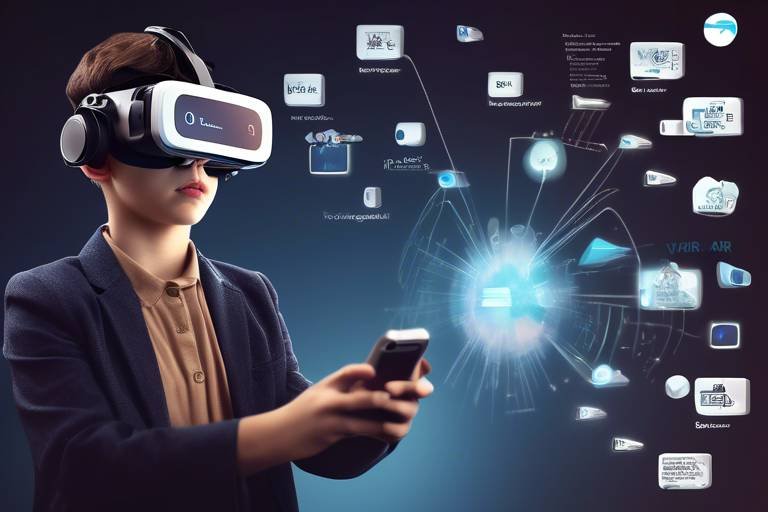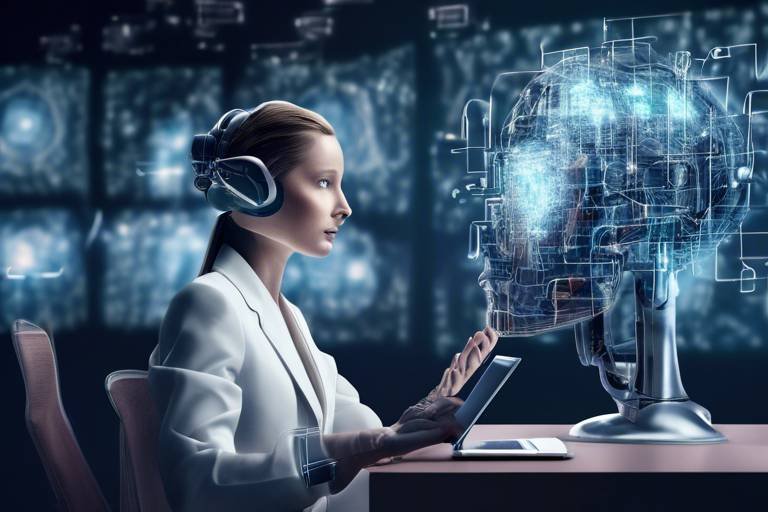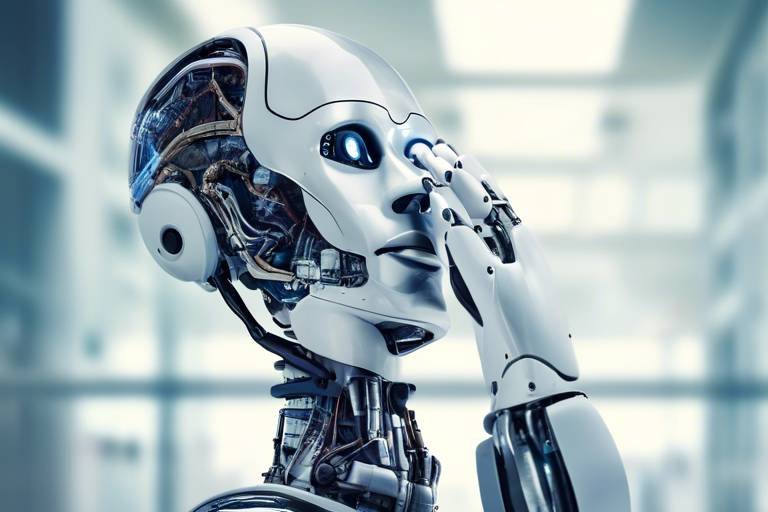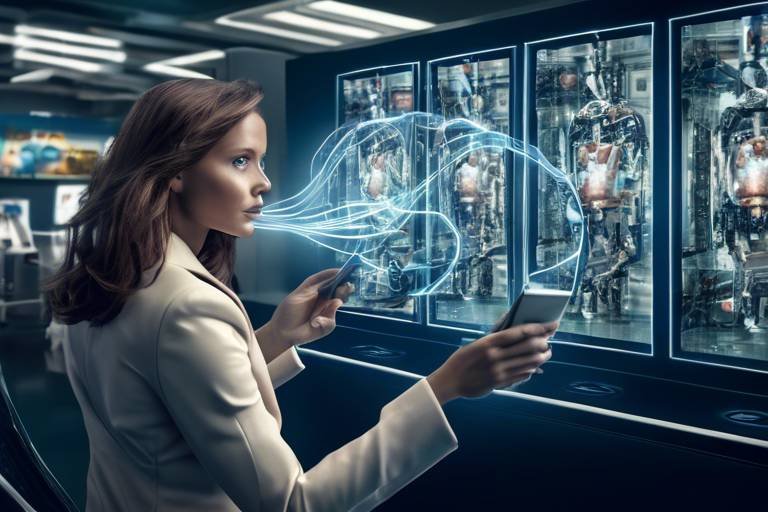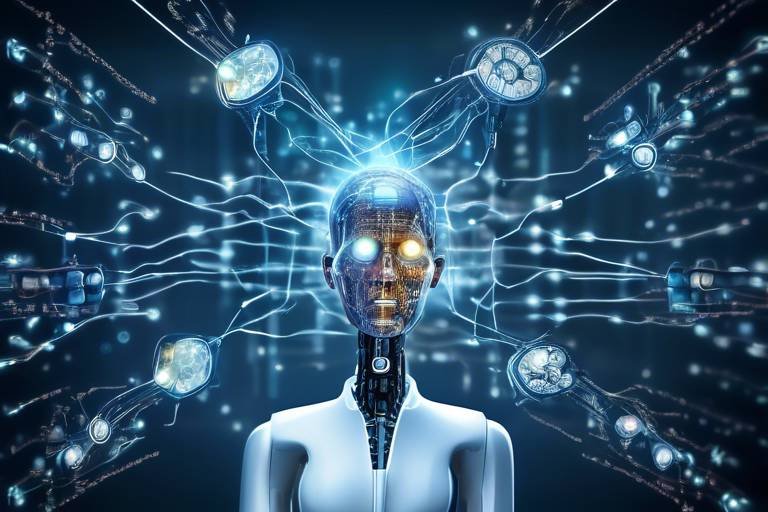Exploring AI's Potential in Mental Health
In recent years, the integration of artificial intelligence (AI) into various sectors has sparked a revolution, and mental health care is no exception. Imagine a world where mental health support is not just a luxury but an accessible resource for everyone. AI has the potential to transform the way we approach mental health by enhancing diagnosis, improving treatment options, and ensuring that support is available to those who need it most. This article delves into the myriad ways AI is reshaping mental health care, highlighting its benefits, challenges, and the ethical considerations that accompany its use.
At its core, AI is about analyzing vast amounts of data to identify patterns and make informed decisions. In the realm of mental health, this means that AI can assist practitioners in diagnosing disorders with greater accuracy than ever before. By leveraging machine learning algorithms, AI can sift through patient data, recognizing subtle indicators that may escape even the most trained eyes. This not only aids in early diagnosis but also enhances the overall treatment process, making it more tailored to individual needs.
Moreover, the rise of AI-powered therapeutic tools, such as chatbots and virtual therapists, has revolutionized the landscape of mental health support. These tools offer immediate assistance to individuals seeking help, breaking down barriers of stigma and accessibility. For many, the thought of reaching out for help can be daunting, but with AI, support is just a click away, available at any hour of the day. This shift not only provides a sense of comfort but also encourages individuals to seek help more readily.
In underserved areas, where access to mental health professionals is limited, AI tools can act as a lifeline. They bridge the gap in care, ensuring that individuals in remote locations receive the support they need. The potential for AI to democratize mental health care is immense, as it offers a solution to the geographical and financial barriers that have long plagued the industry.
Speaking of finances, implementing AI solutions in mental health care can lead to significant cost savings. By streamlining processes and reducing the need for extensive human resources in certain areas, both providers and patients stand to benefit. Imagine a scenario where therapy sessions are not only more effective but also more affordable—this is the promise that AI holds for the future of mental health care.
However, it's vital to recognize that AI is not here to replace traditional therapies; rather, it complements them. The integration of AI with human-led therapy can enhance treatment outcomes, combining the best of both worlds. Patients can receive personalized care that adapts to their unique circumstances, leading to greater satisfaction and improved mental health outcomes.
As we navigate this new frontier, we must also address the ethical considerations that arise with the deployment of AI in mental health. Questions surrounding privacy, consent, and the potential for bias in AI algorithms are paramount. It's essential to ensure that the technology is used responsibly, protecting the rights and well-being of those it aims to help.
Looking ahead, the future of AI in mental health is filled with promise. Emerging trends indicate that personalization of treatment will become increasingly sophisticated, allowing for tailored interventions that resonate with individual patients. Ongoing research and development will play a crucial role in shaping this landscape, paving the way for innovative solutions that enhance mental health care.
In summary, the potential of AI in mental health care is vast and exciting. As we continue to explore this intersection of technology and well-being, we can look forward to a future where mental health support is not only more effective but also more accessible for everyone.
- What is AI's role in diagnosing mental health disorders? AI utilizes machine learning algorithms to analyze patient data and identify patterns, improving diagnostic accuracy.
- How do AI-powered therapeutic tools work? AI tools, like chatbots, provide immediate support and guidance, making mental health resources more accessible to users.
- Can AI replace traditional therapists? No, AI is designed to complement traditional therapies, enhancing treatment outcomes rather than replacing human interaction.
- What are the ethical concerns surrounding AI in mental health? Key concerns include privacy, consent, and the potential for bias in AI algorithms, which must be addressed to protect patients.
- What are the future trends for AI in mental health? Future trends include personalized treatment plans and ongoing research aimed at improving AI applications in mental health care.

The Role of AI in Diagnosis
Artificial Intelligence (AI) is rapidly changing the landscape of mental health diagnosis. Imagine a world where diagnosing mental health disorders is as precise as using a GPS for navigation. AI technologies, particularly machine learning algorithms, are at the forefront of this transformation. These algorithms analyze vast amounts of data—from patient histories to behavioral patterns—allowing clinicians to identify mental health issues with remarkable accuracy.
One of the most exciting aspects of AI in diagnosis is its ability to recognize patterns that might elude even the most experienced professionals. For instance, AI can sift through thousands of patient records and highlight subtle indicators of conditions like depression or anxiety that may not be immediately apparent. This capability not only enhances diagnostic accuracy but also speeds up the process, enabling timely intervention for those in need.
To illustrate the impact of AI in diagnosis, consider the following table that outlines some key technologies and their applications:
| AI Technology | Application | Benefits |
|---|---|---|
| Natural Language Processing (NLP) | Analyzing patient conversation for emotional cues | Improves understanding of patient sentiments |
| Predictive Analytics | Forecasting potential mental health crises | Enables proactive care and intervention |
| Image Recognition | Identifying signs of mental distress through facial expressions | Provides objective data for diagnosis |
This technological advancement not only benefits clinicians but also empowers patients. With AI's assistance, individuals can receive more accurate diagnoses, which is crucial for effective treatment. As AI continues to evolve, the potential for integrating these diagnostic tools into everyday clinical practice grows exponentially. But how do we ensure that these technologies are used effectively and ethically?
While the advantages of AI in diagnosis are clear, it is essential to recognize that these systems are not infallible. They rely heavily on the data fed into them, which raises questions about data quality and representation. Furthermore, the integration of AI into mental health care must be accompanied by rigorous training for practitioners to interpret AI-generated insights appropriately. After all, technology should enhance human judgment, not replace it.
In conclusion, AI's role in the diagnosis of mental health disorders is a promising frontier that holds the potential to revolutionize how we approach mental health care. By harnessing the power of data and machine learning, we can not only improve diagnostic accuracy but also ensure that individuals receive the timely help they need. As we navigate this exciting journey, it is crucial to maintain a balance between innovation and ethical considerations to safeguard patient well-being.
- How does AI improve mental health diagnosis? AI analyzes large datasets to identify patterns that help clinicians make more accurate diagnoses.
- Are AI diagnostics reliable? While AI can enhance diagnostic accuracy, it is essential to combine AI insights with human expertise for the best outcomes.
- What are the ethical considerations of using AI in mental health? Key concerns include data privacy, consent, and the potential for algorithmic bias that could affect diagnosis.

AI-Powered Therapeutic Tools
The advent of artificial intelligence in mental health care is nothing short of revolutionary. Imagine having a supportive companion available at any hour of the day, ready to listen and provide guidance. This is the reality that AI-powered therapeutic tools, such as chatbots and virtual therapists, are bringing to the forefront of mental health support. These technologies harness the power of machine learning and natural language processing to create interactive experiences that can significantly enhance the way individuals seek help.
One of the most exciting aspects of AI in therapy is its ability to provide immediate support. Traditional therapy often requires scheduling appointments, which can lead to long wait times and increased anxiety for those in need. On the other hand, AI tools are available 24/7, offering users the chance to engage in conversations whenever they feel the need. This level of accessibility is particularly beneficial for individuals living in remote areas or those who may feel uncomfortable seeking help in person.
Moreover, AI-powered tools can deliver a range of therapeutic options. For instance, some chatbots are designed to help users manage their emotions by guiding them through cognitive-behavioral therapy (CBT) techniques. These tools can prompt users to identify negative thought patterns and replace them with more positive and constructive ones. The effectiveness of such tools has been supported by various studies, showing that users often report improved mental well-being after engaging with these AI companions.
However, it’s essential to recognize that while AI tools offer numerous benefits, they are not intended to replace human therapists. Instead, they serve as a complement to traditional therapy, providing support between sessions or for those who may not yet be ready to engage in face-to-face therapy. The integration of AI with human-led therapy can enhance treatment outcomes, as therapists can use insights gathered from AI interactions to tailor their approach to individual patients.
Furthermore, the cost-effectiveness of AI solutions cannot be overlooked. With rising healthcare costs, AI tools can provide a more affordable option for many individuals seeking mental health support. By reducing the need for in-person visits and streamlining the therapeutic process, AI can help lower overall treatment expenses. For instance, a recent study indicated that implementing AI in therapy could reduce costs by up to 30%, making mental health care more accessible to a broader population.
In conclusion, AI-powered therapeutic tools are reshaping the landscape of mental health support. They offer immediate assistance, enhance accessibility, and serve as a valuable complement to traditional therapies. As we continue to explore the potential of these technologies, it’s crucial to remain mindful of their limitations and ethical considerations. The future of mental health care lies in a harmonious blend of AI innovations and human empathy.
- What are AI-powered therapeutic tools? These are applications or programs that use artificial intelligence to provide mental health support, such as chatbots or virtual therapists.
- Can AI replace human therapists? No, AI tools are designed to complement traditional therapy, not replace it. They can provide support between sessions or for individuals who are not ready for face-to-face therapy.
- How effective are AI therapeutic tools? Studies have shown that many users report improved mental well-being after interacting with AI-powered tools, especially when using techniques like cognitive-behavioral therapy.
- Are AI tools accessible to everyone? Yes, AI tools are available 24/7, making them accessible to individuals regardless of location or time constraints.

Accessibility and Availability
In today's fast-paced world, accessibility to mental health resources is more vital than ever. Many individuals face barriers that prevent them from seeking help, whether it's due to geographical limitations, financial constraints, or stigma associated with mental health issues. This is where artificial intelligence (AI) steps in as a game-changer. By leveraging AI technologies, we can significantly enhance the availability of mental health resources, making support just a click away.
Imagine a scenario where someone living in a remote area, far from any mental health facility, can access therapy through an AI-powered chatbot or virtual therapist. These tools are available 24/7, allowing users to seek help at their convenience, breaking down the barriers of traditional therapy hours. No more waiting weeks for an appointment or traveling long distances; AI provides immediate support, which can be a lifeline for many. Additionally, these tools can serve as a first point of contact, guiding individuals through their mental health journey and helping them decide whether they need further professional assistance.
One of the most exciting aspects of AI in mental health is its ability to reach underserved populations. According to recent studies, areas with limited access to mental health professionals often experience higher rates of mental health issues. AI can bridge this gap by providing resources such as:
- Self-help tools: Interactive applications that offer coping strategies and mindfulness exercises.
- Teletherapy: Virtual sessions with licensed therapists, facilitated through AI platforms.
- Community support: Online forums and support groups moderated by AI, ensuring a safe space for discussions.
Moreover, AI can analyze data from various sources, including social media and online surveys, to identify trends and areas in need of support. This proactive approach can help organizations allocate resources more effectively, ensuring that help reaches those who need it most. With the potential to provide tailored resources that address specific community needs, AI is not just a tool but a catalyst for change in mental health care.
As we look to the future, the question remains: how can we ensure that these AI-driven tools are used ethically and responsibly? While the accessibility benefits are undeniable, it is crucial to maintain a balance between technology and human interaction. After all, while AI can provide immediate support, it cannot replace the empathy and understanding that come from human therapists. The integration of AI into mental health care should be seen as a complement to traditional methods, enhancing the overall support system for individuals seeking help.
- How does AI improve accessibility to mental health resources?
AI-powered tools can provide immediate support and resources online, making them available 24/7, especially in areas with limited access to mental health professionals. - Can AI replace traditional therapists?
No, AI is intended to complement traditional therapy by providing additional resources and support, but it cannot replicate the human touch essential for effective therapy. - What types of AI tools are available for mental health support?
There are various AI tools available, including chatbots for self-help, teletherapy platforms, and community support forums.

Cost-Effectiveness of AI Solutions
When we think about the future of mental health care, one of the most exciting aspects is the . Imagine a world where mental health support is not only more accessible but also more affordable. AI technologies are stepping in to make this a reality. By automating routine tasks, streamlining processes, and enhancing diagnostic accuracy, AI can significantly reduce the costs associated with mental health care.
For instance, traditional therapy often involves lengthy sessions with licensed professionals, which can be prohibitively expensive for many individuals. AI-powered tools, such as chatbots and virtual therapists, can offer immediate support at a fraction of the cost. These tools can handle a large volume of inquiries, providing users with instant responses and guidance without the need for a human therapist to be present. This not only saves money but also ensures that patients receive timely assistance when they need it most.
Moreover, the integration of AI in mental health care can lead to better resource allocation. By automating administrative tasks like scheduling appointments or managing patient records, mental health professionals can focus more on direct patient care. This shift not only enhances the quality of care but also optimizes the use of healthcare resources, ultimately leading to cost savings for both providers and patients.
To illustrate the potential financial benefits, consider the following table that compares traditional therapy costs with AI-assisted options:
| Service Type | Average Cost per Session | Estimated Annual Cost (12 Sessions) |
|---|---|---|
| Traditional Therapy | $100 - $250 | $1,200 - $3,000 |
| AI-Powered Therapy | $20 - $50 | $240 - $600 |
This table clearly demonstrates the potential savings when opting for AI solutions. With costs reduced by up to 80%, individuals can access the support they need without the financial burden that often accompanies traditional therapy.
In addition to direct savings, AI can also contribute to long-term cost reductions in mental health care by enabling early intervention. When patients have access to AI tools that help them identify symptoms early on, they are less likely to require intensive and expensive treatments later. This proactive approach can lead to healthier populations and reduced healthcare expenditures overall.
In conclusion, the in mental health care is not just a financial benefit; it represents a shift towards a more inclusive and sustainable model of care. By leveraging technology, we can ensure that mental health support is available to everyone, regardless of their financial situation. As we continue to explore the potential of AI, it’s essential to keep these cost-saving advantages in mind, as they pave the way for a brighter, more accessible future in mental health care.
- How does AI improve the cost of mental health care? AI reduces costs by automating tasks, streamlining processes, and providing affordable therapy options.
- Are AI-powered tools effective in providing mental health support? Yes, many studies show that AI tools can provide effective support, especially for initial assessments and ongoing check-ins.
- Can AI replace human therapists? While AI can enhance therapy, it is not intended to replace human therapists but to complement their work.
- What are the long-term benefits of using AI in mental health care? Long-term benefits include reduced costs, early intervention, and improved access to care.

Integration with Traditional Therapies
In the ever-evolving landscape of mental health care, the integration of artificial intelligence (AI) with traditional therapies is emerging as a game-changer. Imagine a world where the warmth of human interaction meets the precision of AI technology—this is not just a dream but a tangible reality that is reshaping how we approach mental health treatment. AI can serve as a supportive ally for therapists, enhancing their capabilities rather than replacing the invaluable human touch that is so essential in mental health care.
One of the most significant benefits of integrating AI with traditional therapies is the ability to provide real-time data analysis. For instance, AI tools can analyze patient responses during therapy sessions, offering therapists insights into emotional patterns and behavioral changes. This information can help therapists adjust their approaches on-the-fly, making each session more tailored and effective. It's akin to having a co-pilot in the cockpit of a plane—while the pilot (therapist) navigates the emotional landscape, the co-pilot (AI) provides critical data that can lead to a smoother flight.
Moreover, AI can assist in monitoring patient progress outside of therapy sessions. Through mobile apps and wearable devices, patients can log their moods, thoughts, and experiences, which AI algorithms can analyze to provide feedback. This continuous stream of information allows therapists to stay connected with their patients, ensuring that no one feels alone in their journey. It’s like having a supportive friend who checks in regularly, helping to maintain motivation and accountability.
However, it's essential to recognize that the integration of AI into therapy requires a careful balance. While AI can enhance the therapeutic process, it should not overshadow the human elements that are critical to effective treatment. The relationship between therapist and patient is built on trust, empathy, and understanding—qualities that AI, no matter how advanced, cannot replicate. Therefore, the goal should be to use AI as a complementary tool, enhancing traditional methods rather than replacing them. This synergy can lead to improved treatment outcomes and greater patient satisfaction.
To illustrate this integration, consider the following table that highlights the key differences and synergies between traditional therapies and AI-enhanced approaches:
| Aspect | Traditional Therapy | AI-Enhanced Therapy |
|---|---|---|
| Human Interaction | High | Moderate |
| Data Analysis | Limited | Extensive |
| Accessibility | Variable | High |
| Real-Time Feedback | No | Yes |
| Customization of Treatment | Moderate | High |
As we move forward, the integration of AI into traditional therapies presents a promising avenue for mental health care. By embracing this technology, therapists can enhance their practice, providing more personalized care that meets the unique needs of each patient. Ultimately, this collaborative approach can lead to a more effective and holistic treatment experience, ensuring that individuals receive the best of both worlds—the compassion of human care and the precision of AI innovation.
- How does AI improve the therapy process? AI enhances the therapy process by providing real-time data analysis, enabling therapists to tailor their approaches based on patient responses.
- Can AI replace human therapists? No, AI is designed to complement human therapists, not replace them. The human touch in therapy is irreplaceable.
- What are the ethical concerns surrounding AI in mental health? Ethical concerns include privacy, consent, and the potential for bias in AI algorithms.
- How accessible are AI tools for mental health? AI tools can significantly increase accessibility, especially in underserved areas where traditional mental health services may be limited.

Ethical Considerations in AI Use
The integration of artificial intelligence (AI) into mental health care is a double-edged sword, bringing forth numerous advantages while also raising significant ethical concerns. One of the most pressing issues is privacy. With AI systems analyzing sensitive personal data to provide insights and recommendations, the risk of data breaches and unauthorized access becomes a critical concern. Patients must trust that their information remains confidential and secure, which is increasingly challenging in our digital age.
Another vital aspect is informed consent. As AI tools become more prevalent, it is essential for patients to fully understand how their data will be used, the potential risks involved, and the implications of AI-driven recommendations. This understanding is crucial for fostering trust between patients and AI systems. However, the complexity of AI algorithms can make it difficult for individuals to grasp the intricacies of their operation, potentially leading to a lack of true informed consent.
Moreover, there are concerns about bias in AI algorithms. If the data used to train these systems is not diverse or representative of the entire population, there is a risk that the AI may perpetuate existing biases, leading to misdiagnosis or inadequate treatment for certain demographic groups. For instance, if an AI system is primarily trained on data from one ethnic group, it may not accurately identify or address the mental health needs of individuals from different backgrounds.
To tackle these ethical dilemmas, it is essential for developers and practitioners to adopt a set of guiding principles. These principles might include:
- Transparency: Clearly communicating how AI systems work and the data they utilize.
- Accountability: Ensuring that there are mechanisms in place to address errors or biases in AI recommendations.
- Inclusivity: Actively working to include diverse data sets to minimize bias.
- Continuous Monitoring: Regularly reviewing AI systems to ensure they adapt to new findings and societal changes.
In conclusion, while AI has the potential to revolutionize mental health care, it is imperative to approach its implementation with caution. By addressing these ethical considerations head-on, we can work towards a future where AI not only enhances mental health services but does so in a manner that respects and protects the rights of patients.
1. What are the main ethical concerns regarding AI in mental health?
The main ethical concerns include privacy issues, informed consent, and the potential for bias in AI algorithms.
2. How can bias in AI algorithms be minimized?
Bias can be minimized by using diverse and representative data sets during the training of AI systems and by regularly reviewing and updating the algorithms.
3. Why is informed consent important in AI use?
Informed consent is crucial because patients need to understand how their data will be used and the potential risks involved, fostering trust in AI systems.
4. What role do developers play in ensuring ethical AI use?
Developers are responsible for creating transparent, accountable, and inclusive AI systems, as well as for continuously monitoring their performance to address any ethical concerns.

Future Trends in AI and Mental Health
As we look ahead, the intersection of artificial intelligence and mental health care is poised for remarkable evolution. The rapid advancements in technology are paving the way for innovative approaches that could redefine how we understand and treat mental health disorders. Imagine a world where personalized treatment plans are not just a luxury but a standard, where AI algorithms analyze vast amounts of data to tailor interventions that resonate with individual needs. This is not science fiction; it’s the future we are stepping into.
One of the most exciting trends is the personalization of treatment. AI has the potential to delve deep into a patient’s history, preferences, and responses to previous therapies. By leveraging this data, mental health professionals can create highly customized treatment plans that are more likely to yield positive outcomes. For instance, if a patient responds well to cognitive-behavioral therapy but struggles with medication adherence, AI can suggest a hybrid approach that emphasizes therapy while minimizing medication adjustments.
Moreover, ongoing research and development in AI applications are critical for enhancing mental health care. Universities and tech companies are collaborating to explore new algorithms and models that can predict mental health crises before they occur. By integrating predictive analytics into routine assessments, practitioners could intervene earlier, potentially saving lives. The question remains: how can we ensure these technologies are accessible and effective for all populations?
To address this, researchers are focusing on the diversity of data used to train AI systems. A significant concern is that many AI algorithms are developed using data from predominantly homogeneous groups, leading to biases that may affect the efficacy of treatments across different demographics. The future of AI in mental health must prioritize inclusivity, ensuring that all voices are heard and represented in the data that drives these technologies.
Another key trend is the integration of AI with traditional therapies. While some fear that AI might replace human therapists, the reality is quite the opposite. AI can serve as a powerful complement to human-led therapy. For example, virtual therapists can provide immediate support between sessions, helping patients practice coping strategies or mindfulness exercises. This hybrid model not only enhances treatment outcomes but also increases patient satisfaction by ensuring that help is available whenever it’s needed.
As we embrace these advancements, it’s essential to remain vigilant about the ethical considerations surrounding AI in mental health. Questions about privacy, consent, and algorithmic bias must be at the forefront of discussions among developers, practitioners, and policymakers. Ensuring that AI tools are built on a foundation of ethical principles will be crucial as we navigate this new landscape.
In summary, the future of AI in mental health is bright, filled with potential to revolutionize how we diagnose and treat mental health issues. By focusing on personalization, inclusivity, and ethical practices, we can harness the power of AI to improve mental health outcomes for everyone. The journey ahead is not just about technology but about creating a supportive and understanding environment for those in need.
- How does AI personalize mental health treatment?
AI analyzes individual patient data to tailor treatment plans that fit specific needs, preferences, and responses to previous therapies. - What ethical concerns are associated with AI in mental health?
Key concerns include privacy, consent, and potential biases in AI algorithms that may affect treatment efficacy across different populations. - Can AI replace human therapists?
No, AI is designed to complement traditional therapies by providing additional support and resources, not to replace human interaction. - What is the role of research in AI mental health applications?
Ongoing research is crucial for developing effective AI tools that can predict mental health crises and improve treatment strategies.

Personalization of Treatment
When it comes to mental health care, one size definitely does not fit all. Each individual is unique, with their own experiences, emotions, and psychological landscapes. This is where the magic of artificial intelligence comes into play, allowing for a level of personalization that was previously unimaginable. Imagine being able to receive a treatment plan that is not just a generic template, but one that is tailored specifically to your needs, preferences, and circumstances. Sounds like a dream, right? Well, thanks to advancements in AI, this dream is becoming a reality.
AI leverages vast amounts of data—from genetic information to behavioral patterns—to create a comprehensive profile of the individual. By analyzing this data, AI can identify specific triggers and recommend targeted interventions. For example, if a patient struggles with anxiety primarily triggered by social situations, AI can suggest therapies that focus on social skills training or cognitive behavioral techniques that address these specific fears.
Moreover, the personalization of treatment through AI doesn't just stop at diagnosis. It extends to the ongoing management of mental health conditions. AI systems can continuously monitor a patient's progress through various metrics, such as mood tracking apps or wearable devices that measure physiological responses. This real-time data can inform adjustments to the treatment plan, ensuring that it evolves as the patient's needs change. It's like having a personal coach who is always ready to adapt your training regimen based on how you’re feeling that day.
Consider the following benefits of personalized treatment powered by AI:
- Improved Engagement: When treatment feels relevant and tailored, patients are more likely to engage with it actively.
- Enhanced Outcomes: Personalized interventions are often more effective, leading to better overall mental health outcomes.
- Increased Satisfaction: Patients who feel their treatment is customized to their needs report higher satisfaction levels.
Furthermore, the use of AI in personalizing treatment plans can also help in identifying potential side effects and contraindications based on an individual's unique profile. This means that the risk of adverse reactions can be significantly minimized, leading to safer, more effective treatment options. Imagine being able to avoid the trial-and-error approach that often accompanies mental health treatment; AI makes this possible!
In summary, the personalization of treatment through AI is not just a trend; it’s a significant leap forward in how we approach mental health care. By utilizing data-driven insights to create tailored interventions, AI is paving the way for a more effective, engaging, and satisfying treatment experience for patients. As we continue to explore the potential of AI in this field, the future looks brighter than ever for those seeking mental health support.
- How does AI personalize treatment for mental health?
AI analyzes individual data, including behavioral patterns and past treatment responses, to tailor interventions that best suit each patient. - Is AI safe to use in mental health treatment?
Yes, AI can enhance safety by identifying potential side effects and contraindications based on a person’s unique profile. - Can AI replace traditional therapists?
No, AI is designed to complement traditional therapies, providing additional support rather than replacing human interaction. - What role does data play in AI’s effectiveness?
Data is crucial as it informs AI algorithms, enabling them to make informed recommendations and adjustments to treatment plans.

Research and Development in AI
Research and development in the realm of artificial intelligence (AI) is akin to a thrilling roller coaster ride, filled with unexpected twists and turns that promise to reshape the landscape of mental health care. As we delve deeper into the capabilities of AI, we uncover a treasure trove of innovations designed to enhance the way we diagnose and treat mental health disorders. From sophisticated algorithms capable of analyzing vast amounts of data to cutting-edge research that pushes the boundaries of what we thought possible, the future of AI in mental health is both exciting and transformative.
One of the most significant areas of focus in AI research is the development of machine learning models that can accurately predict mental health issues based on a variety of inputs. These models are trained on extensive datasets, allowing them to identify subtle patterns that may escape even the most experienced professionals. For instance, researchers are exploring how social media activity, speech patterns, and even biometric data can provide insights into an individual's mental state. The implications are profound: imagine a world where early intervention is possible, significantly improving outcomes for those at risk.
Moreover, ongoing studies are investigating the effectiveness of AI-powered therapeutic tools, such as virtual therapists and chatbots. These tools are not just gimmicks; they are backed by rigorous research that aims to validate their efficacy. For example, a recent study indicated that users of AI chatbots reported a 30% improvement in their mental health status after just a few weeks of interaction. Such findings highlight the potential for AI to provide immediate support and resources to individuals who may otherwise hesitate to seek help.
To further enhance our understanding of AI's role in mental health, researchers are also focusing on personalization. By utilizing AI to analyze individual responses to various treatments, scientists can develop tailored therapeutic approaches that resonate with each patient's unique needs. This level of customization is a game-changer, as it shifts the paradigm from a one-size-fits-all model to a more nuanced, effective strategy that can lead to better patient outcomes.
However, it's essential to acknowledge that the journey of AI in mental health is not without challenges. Ethical considerations are at the forefront of discussions surrounding AI development. Researchers are grappling with questions of privacy, consent, and the potential for bias in AI algorithms. For instance, if an AI system is trained on data that lacks diversity, it may inadvertently perpetuate existing disparities in mental health care. Therefore, ongoing research must prioritize ethical frameworks to ensure that AI serves all populations equitably.
As we look to the future, the potential for AI in mental health care is boundless. Emerging technologies, such as natural language processing and deep learning, are set to further enhance our ability to understand and treat mental health issues. These advancements could lead to the development of more intuitive AI systems that can engage with patients in a manner that feels genuinely supportive and empathetic. The intersection of technology and mental health is a frontier ripe for exploration, and the ongoing research will be crucial in determining how we navigate this exciting landscape.
| Research Focus | Potential Impact |
|---|---|
| Machine Learning Models | Improved diagnostic accuracy and early intervention |
| AI Therapeutic Tools | Accessible mental health support and immediate resources |
| Personalized Treatment Plans | Enhanced effectiveness of interventions tailored to individual needs |
| Ethical Frameworks | Ensuring equitable access and reducing biases in AI algorithms |
As we continue to explore the potential of AI in mental health through rigorous research and development, the possibilities for improving patient care are virtually limitless. The collaboration between AI technologies and mental health professionals will pave the way for a future where mental health care is not only more effective but also more compassionate and accessible to all.
- What is the role of AI in mental health diagnosis? AI helps in identifying patterns in data that can lead to more accurate diagnoses of mental health disorders.
- How do AI-powered therapeutic tools work? These tools use algorithms to engage users in conversations, providing support and resources based on their input.
- Are AI solutions cost-effective? Yes, AI can significantly reduce costs associated with mental health care by streamlining processes and enhancing treatment efficiency.
- What ethical concerns are associated with AI in mental health? Key concerns include privacy, consent, and potential biases in algorithms that may affect treatment outcomes.
- What does the future hold for AI in mental health? The future includes more personalized treatments, innovative research, and a broader acceptance of AI tools in standard mental health practices.
Frequently Asked Questions
- How does AI assist in diagnosing mental health disorders?
AI utilizes machine learning algorithms to analyze vast amounts of data, identifying patterns that may not be immediately apparent to human clinicians. By examining various indicators—like speech patterns, social media activity, and physiological data—AI can enhance diagnostic accuracy, leading to earlier and more effective interventions.
- What are AI-powered therapeutic tools?
AI-powered therapeutic tools include chatbots and virtual therapists designed to provide mental health support. These tools can engage users in conversations, offer coping strategies, and even guide them through therapeutic exercises. They are particularly valuable for individuals seeking immediate help or those who may feel uncomfortable in traditional therapy settings.
- How do AI tools improve accessibility to mental health resources?
AI tools can bridge the gap in mental health care by providing resources to underserved areas where professional help may be scarce. By offering 24/7 access to support, individuals can receive assistance when they need it most, regardless of their location. This can be a game-changer for those who might otherwise go without care.
- Are AI solutions cost-effective for mental health care?
Yes, implementing AI in mental health care can significantly reduce costs. By streamlining diagnostic processes and providing scalable therapeutic solutions, both healthcare providers and patients can benefit from lower expenses. This financial efficiency can lead to wider access to care and improved outcomes.
- Can AI replace traditional therapy?
No, AI is not intended to replace traditional therapy. Instead, it can complement human-led therapy by providing additional resources and support. The integration of AI tools with traditional practices can enhance treatment outcomes, allowing therapists to focus on more complex aspects of care while AI handles routine check-ins and assessments.
- What ethical concerns surround the use of AI in mental health?
The deployment of AI in mental health raises important ethical questions, particularly regarding privacy and consent. Concerns about data security, the potential for bias in algorithms, and the need for transparency in AI decision-making processes are critical issues that must be addressed to ensure ethical practices in this evolving field.
- What future trends can we expect in AI and mental health?
Emerging trends in AI and mental health include increased personalization of treatment plans and ongoing research aimed at improving AI applications. As technology advances, we can expect more sophisticated tools that leverage data to tailor interventions to individual needs, ultimately enhancing the effectiveness of mental health care.
- How is AI facilitating personalized treatment in mental health?
AI facilitates personalized treatment by analyzing individual data to create tailored intervention strategies. By considering factors such as personal history, preferences, and responses to previous treatments, AI can help clinicians design more effective, individualized care plans that resonate with each patient's unique circumstances.
- What role does research and development play in AI for mental health?
Ongoing research is crucial for advancing AI applications in mental health. It helps identify new methodologies, improve existing algorithms, and explore innovative ways to integrate AI into mental health care. This research is essential for ensuring that AI tools remain effective, ethical, and aligned with the needs of patients and practitioners alike.


